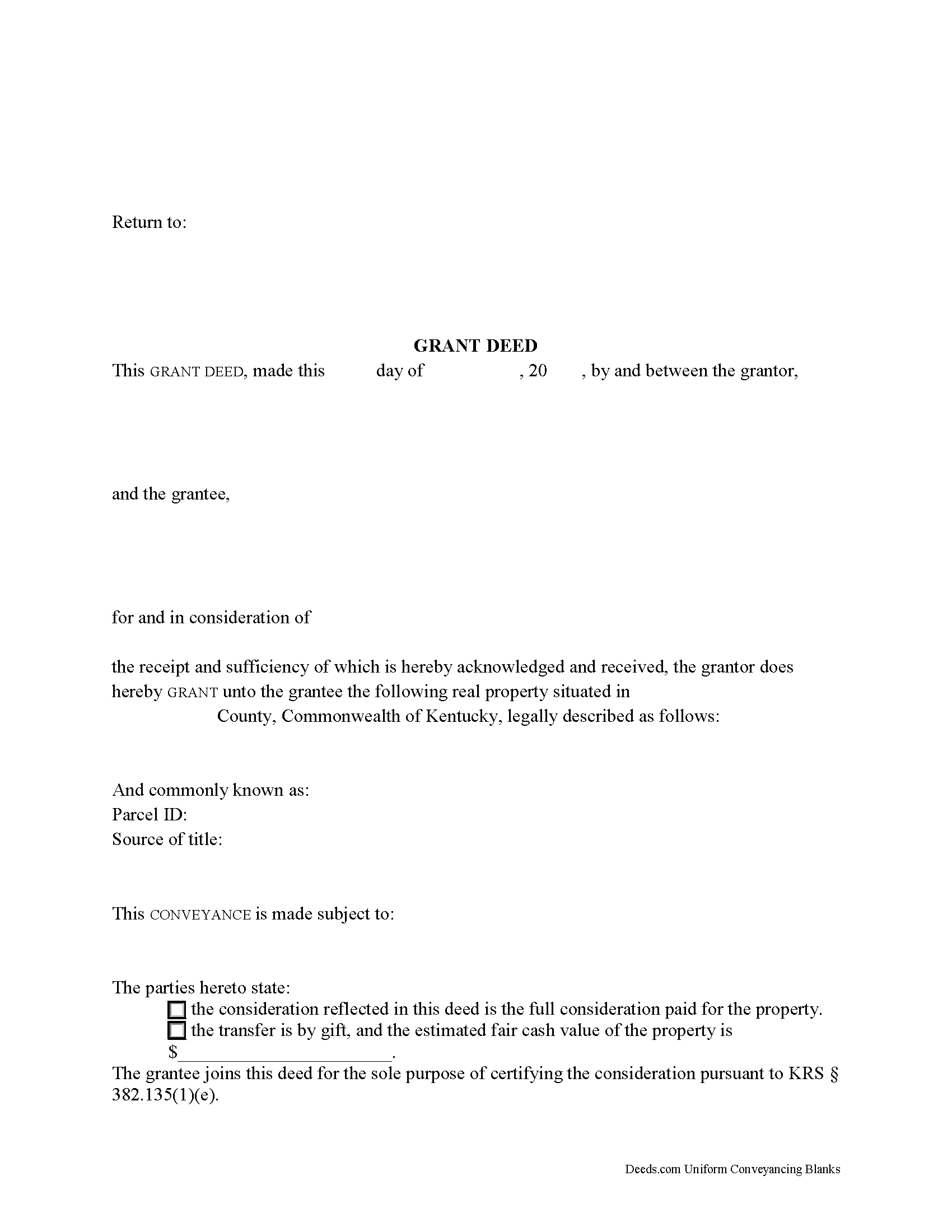Kentucky Grant Deed
County Forms
Where is the property located?
Adair CountyAllen CountyAnderson CountyBallard CountyBarren CountyBath CountyBell CountyBoone CountyBourbon CountyBoyd CountyBoyle CountyBracken CountyBreathitt CountyBreckinridge CountyBullitt CountyButler CountyCaldwell CountyCalloway CountyCampbell CountyCarlisle CountyCarroll CountyCarter CountyCasey CountyChristian CountyClark CountyClay CountyClinton CountyCrittenden CountyCumberland CountyDaviess CountyEdmonson CountyElliott CountyEstill CountyFayette CountyFleming CountyFloyd CountyFranklin CountyFulton CountyGallatin CountyGarrard CountyGrant CountyGraves CountyGrayson CountyGreen CountyGreenup CountyHancock CountyHardin CountyHarlan CountyHarrison CountyHart CountyHenderson CountyHenry CountyHickman CountyHopkins CountyJackson CountyJefferson CountyJessamine CountyJohnson CountyKenton CountyKnott CountyKnox CountyLarue CountyLaurel CountyLawrence CountyLee CountyLeslie CountyLetcher CountyLewis CountyLincoln CountyLivingston CountyLogan CountyLyon CountyMadison CountyMagoffin CountyMarion CountyMarshall CountyMartin CountyMason CountyMccracken CountyMccreary CountyMclean CountyMeade CountyMenifee CountyMercer CountyMetcalfe CountyMonroe CountyMontgomery CountyMorgan CountyMuhlenberg CountyNelson CountyNicholas CountyOhio CountyOldham CountyOwen CountyOwsley CountyPendleton CountyPerry CountyPike CountyPowell CountyPulaski CountyRobertson CountyRockcastle CountyRowan CountyRussell CountyScott CountyShelby CountySimpson CountySpencer CountyTaylor CountyTodd CountyTrigg CountyTrimble CountyUnion CountyWarren CountyWashington CountyWayne CountyWebster CountyWhitley CountyWolfe CountyWoodford CountyGrant Deed for Real Estate Located in Kentucky

Real estate conveyances in Kentucky are governed by Chapter 382 of the Kentucky Revised statutes, but the statutes do not specifically address grant deeds.
A grant deed is a legal document used to transfer, or convey, rights in real property from a grantor (seller) to a grantee (buyer). A recorded grant deed imparts notice of transfer to all persons, including subsequent purchasers or mortgagees. They contain covenants, or guarantees, that the grantor has not previously sold the real property interest being conveyed, and that the property is being conveyed to the grantee without any undisclosed liens or encumbrances. Grant deeds do not generally require the grantor to defend title claims.
The deed must meet all state and local standards for recorded documents. A lawful grant deed identifies the grantor and grantee, with their full names and addresses, and states how the grantee will hold title to the property. For Kentucky residential property, the primary methods for holding title in co-ownership are tenancy in common, joint tenancy, and tenancy by entirety. A grant of ownership of real estate to two or more persons creates a tenancy in common, unless otherwise specified (KRS 381.050(1)). It also includes a complete legal description and physical address of the property. Explain the source of the current grantor's title and include the in-care-of tax address where the property tax bill may be sent (KRS 382.110(2)). The preparer of the instrument must sign the document (KRS 382.335).
State either the full amount of consideration exchanged during the transfer, or if nominal or no consideration has been exchanged, the fair cash value of the property in the consideration certificate section pursuant to KRS 385.135. The county assesses a transfer tax on the consideration, due at the time of recording, unless the transaction is exempt under KRS 142.050.
After the grantor signs the completed deed in front of a notary, record it, along with any supplemental documentation necessary for the specific transaction, in the county in which the property is located (KRS 382.030, 382.110(1)). Recording provides public knowledge of the change in ownership and helps to maintain a clear chain of title.
This article is provided for informational purposes only and is not a substitute for legal advice. Contact a lawyer with questions about grant deeds or any other issues related to the transfer of real property in Kentucky.
(Kentucky Grant Deed Package includes form, guidelines, and completed example)